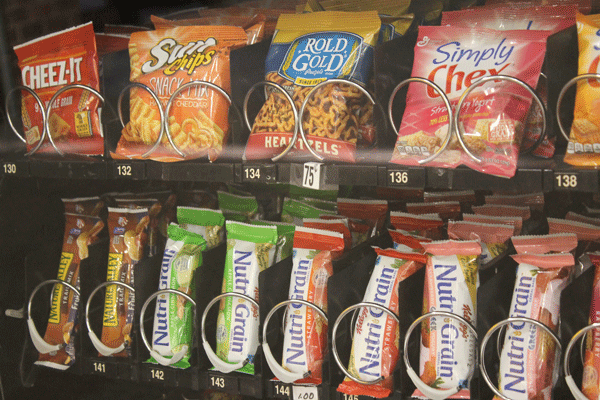
Michelle Obama’s campaign for obesity prevention, “Let’s Move,” prompted the Senate to propose the Healthy Hunger-Free Kids Act, providing healthy options served at school to all students.
The new standards include a list of certain requirements that school lunches have to meet. A food item cannot be more than 350 calories per meal and 200 calories per snack. The food item cannot cross over a certain amount of fat, sugar, and sodium, and needs nutritional value with almost no empty calories.
The policy also states that the same new nutritional standards applied to school lunches are used for fundraising as well. Two school days per semester are allowed to fundraise with food that doesn’t fall within nutrition guidelines.
However, students may run food-based fundraising activities off-campus or 30 minutes after school ends. Students may purchase an item at school that can only be consumed or prepared at home, like cookie dough.
DECA, FBLA, and ROTC are some of the groups being impacted. The food they sold in the previous school years cannot be permitted for fundraising purposes on school grounds.
FBLA’s students marketed candy bars during the fall and Krispy Kreme donuts three days a week throughout the school year.
“We fundraise to send our national qualifiers so we don’t have to pay so much if we make it to nationals. With the fundraising being affected that might affect how much FBLA can put for national qualifiers this year,” senior Christian Perdomo said.
DECA can relate; the new legislation means a year of cookie sales is gone.
“Recently losing the cookie store is literally making us lose $10,000 right now, so we’re trying to find ways to gain the money back but in a way that kids will actually enjoy the food that we have,” senior Tyra Slade said.
DECA is considering selling Otis Spunkmeyer cookie dough and pretzels instead.
Because the clubs are going through a deficit in profit, they’re trying to make the best of the situation. The clubs will try and utilize the four days given per year to fundraise.
“Last year we started Krispy Kreme because they are a national sponsor of FBLA, and it worked out great. We earned a lot of money selling donuts three days a week, so with that being off the table we are still going to utilize our four days during the year and will sell donuts all day long on those four days,” FBLA sponsor Pat Hinkle said.
DECA is also taking advantage of the two days per semester.
“Our ideas are hopefully incorporating it with some spirit weeks and getting people happy for spirit weeks means getting more money to spend hopefully. We’re definitely using all of those days,” senior Jazmine Rosemond said.
Last year, ROTC participated in a fundraiser selling Chick-fil-A to students while the school dismissal bell rang; now, the Healthy Hunger-Free Kids Act restricts selling the sandwiches on school property.
“We won’t be able to do it because of the calories we’re allowed to have as students,” senior James Lewis said.
Although the new legislation shook things up for students at West, at least one student sees a silver lining.
“At the same time…I think it’s a great time and a great way for all the DECA students to show what we’re really about because this is what we do, finding new ideas and actually being marketing students. So it’s a great opportunity,” Slade said.
The changes also apply to lunch.
“I find it easier because they tell me exactly what I have to serve. Before we could pick and choose vegetables, but this way I know exactly what we’re going to serve. The thing is if the kids don’t eat it what do you do?” head of kitchen staff Beverly Riha said.
According to the Government Accountability Office (GAO), 48 out of 50 states found difficulties with the act. Combinations like cheese sticks and shrimp were served to try and maneuver with the new rules in some schools. Students purchasing school lunches declined by more than one million last year alone.
Junior Josiah Ewing remarked on the whole grain bread that is used for school lunches.
“I remember we had a chicken patty for lunch and it was just disgusting. I didn’t eat the bread on it, just the patty,” Ewing said.
Other students disagree with the reduction of calories present in lunches.
“I play football and I know that I’m hungry when I go to practice. I’d rather be full at school. That way I can focus in my classes,” junior Adonis Dotson said.
Still, some see the new policy differently.
“I didn’t really notice any changes. I’m a person who normally at school tries to make healthier decisions anyway and I feel like that’s something everybody should consider. Even athletes who say that they need more calories during the day that’s completely understandable, but at the end of the day it’s about what you’re putting in your body not how much,” senior Delaney Jackson said.
Katie Allen Sports Editor





















